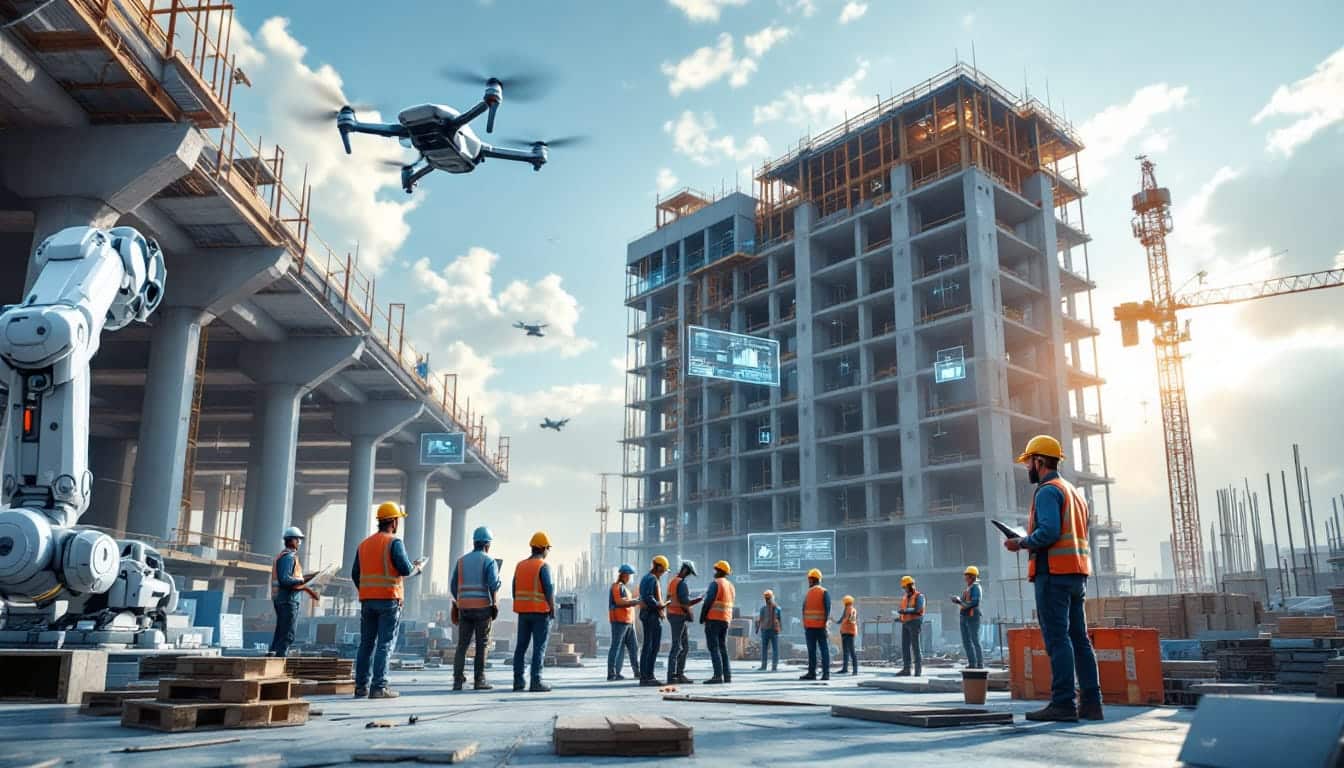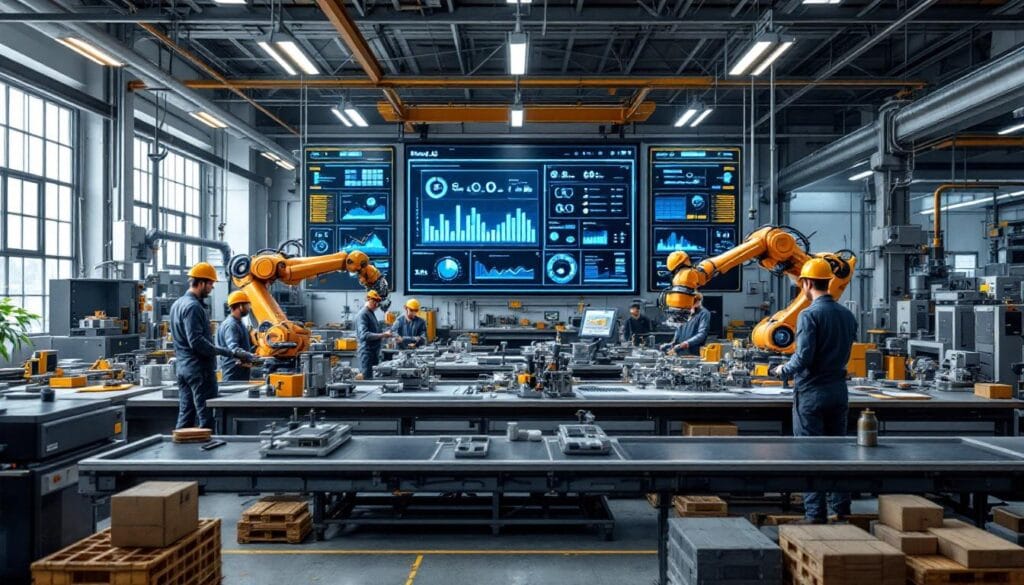The construction sector is undergoing significant changes with the advent of Industry 4.0. These technological advancements are profoundly transforming traditional methods and paving the way for a new era of innovation. However, integrating these modern tools presents significant challenges for professionals in the field.
For instance, restricted access to certain research platforms complicates the dissemination of essential knowledge. Additionally, companies must rethink their logistics strategies in order to optimize workflow and ensure the resilience of their operations. Rapid adaptation thus becomes an unavoidable necessity to remain competitive in this constantly evolving environment.

Table des matières
ToggleIntroduction to Industry 4.0 in Construction
The industry 4.0 is revolutionizing many sectors, and construction is no exception to this transformation. The convergence of digital and physical technologies offers unprecedented opportunities to optimize processes, improve quality, and strengthen the resilience of supply chains. But what is the level of preparedness of the construction sector in the face of this technological revolution? This article explores the various aspects of this integration and evaluates the sector’s maturity regarding the adoption of industry 4.0.
What are the main technologies of Industry 4.0 applied to construction?
Industry 4.0 integrates several key technologies that transform the construction sector. Among them, the Internet of Things (IoT) enables the connection and communication between machines, equipment, and management systems. Smart buildings, equipped with advanced sensors, offer real-time monitoring of environmental and structural conditions, thus facilitating preventive maintenance.
Augmented reality (AR) and virtual reality (VR) also play a crucial role by allowing professionals to visualize projects in 3D before their realization, thus improving planning and detection of potential errors. Moreover, artificial intelligence (AI) and machine learning optimize decision-making processes by analyzing vast amounts of data to forecast trends and future needs.
Finally, robotics and automation facilitate repetitive and dangerous tasks, thus reducing risks for workers while increasing efficiency. All these technologies, when integrated coherently, create smarter, safer, and more efficient construction environments.
What is the level of adoption of 4.0 technologies in construction?
The level of adoption of industry 4.0 technologies in construction varies significantly by region and companies. In leading countries in technological innovation, such as Germany and the United States, many construction companies have already integrated advanced solutions such as autonomous cranes (Learn more) and smart supply chains (Discover the innovations). These companies benefit from better operational efficiency and a significant reduction in costs due to automation and real-time data analysis.
However, in developing regions, adoption remains slower due to budget constraints and a lack of specialized skills. Nevertheless, initiatives such as the launch of the Industry 4.0 Academy by Penn State & DuBois (See the program) show a growing commitment to training skilled professionals and promoting the integration of advanced technologies in the construction sector.
Adoption is also accompanied by challenges related to the interoperability of systems, data security, and resistance to change among workers. To overcome these obstacles, it is essential that companies invest in training and skill development while collaborating with reliable technology partners.
What are the benefits of Industry 4.0 for the construction sector?
The integration of industry 4.0 in construction offers a multitude of benefits that revolutionize the sector. One of the main benefits is the improvement of operational efficiency. Through automation and intelligent resource management, projects can be completed more quickly and with greater accuracy, thereby reducing associated delays and costs.
The quality of constructions is also improved. Real-time monitoring technologies allow for the detection and correction of defects before they become major issues. Moreover, the use of smart materials and advanced construction techniques contributes to creating more durable and resilient structures.
Another significant advantage is the reduction of risks. Autonomous equipment and smart management systems minimize workers’ exposure to hazardous environments. Furthermore, the transparency and traceability provided by digital technologies facilitate project management and ensure compliance with safety standards and regulations in force.
Finally, industry 4.0 fosters better collaboration among the various stakeholders in the project. Digital platforms allow for smooth communication and effective coordination among architects, engineers, contractors, and suppliers, thereby ensuring cohesion throughout the project’s lifecycle.
What challenges must be overcome for successful adoption of Industry 4.0 in construction?
The adoption of industry 4.0 in construction is not without challenges. One of the main obstacles is the initial cost of implementing new technologies. The investments needed to acquire advanced equipment, train staff, and adapt infrastructure can represent a significant barrier, especially for small and medium enterprises.
Another major challenge is the lack of specialized skills. The transition to automated and intelligent systems requires a qualified workforce capable of managing and maintaining these technologies. The deficit of appropriate training and the constant need to update skills represent major issues for the sector.
Data security is also an increasing concern. The rise in connectivity and the use of cloud-based systems expose companies to heightened risks of cyberattacks and data breaches. It is crucial to implement robust security measures to protect sensitive information and ensure the continuity of operations.
Finally, the resistance to change among workers and managers poses a hindrance to the adoption of new technologies. The organizational culture must evolve to encourage innovation and the adoption of digital tools. This requires proactive change management, including training, communication, and employee involvement in the transformation process.
How can companies prepare for Industry 4.0 in construction?
To effectively prepare for the integration of industry 4.0, construction companies must adopt a strategic and gradual approach. The first step is to assess the needs and opportunities specific to their activity. This involves conducting a comprehensive diagnosis of current processes and identifying areas where 4.0 technologies can bring significant improvements.
Investment in training and skill development is essential. Companies must offer continuous training programs to enable their employees to acquire the necessary skills for the use and maintenance of new technologies. Partnerships with educational institutions, such as the NCAP LaunchBox program, can facilitate this learning.
It is also crucial to develop a suitable technological infrastructure. This includes integrating compatible systems, establishing secure networks, and adopting efficient data management platforms. A solid infrastructure allows for fully leveraging the advantages offered by industry 4.0.
Collaboration with technology partners is another key step. Working with reliable technology vendors and digital transformation experts can accelerate the adoption process and ensure effective implementation of the chosen solutions.
Finally, companies must instill a culture of innovation within their organization. Encouraging experimentation, valuing innovative initiatives, and recognizing successes contribute to creating an environment conducive to the adoption of 4.0 technologies.
What are the successful examples of integrating Industry 4.0 in construction?
Several companies and projects successfully illustrate the integration of industry 4.0 into the construction sector. One notable example is Tesla, which is preparing to enter the era of industry 4.0 by improving its rating and integrating advanced technologies into its manufacturing and construction processes (Read the article). This approach optimizes operations and strengthens the company’s competitiveness in the global market.
Another inspiring example is the Manufacturers Podcast, which highlights pioneering leaders in industry 4.0 and the issues associated with initiatives such as the Trump tax (Listen to the podcast). These leaders demonstrate how early adoption of technologies can generate sustainable competitive advantages and foster continuous innovation.
In Germany, the market for autonomous cranes is set to thrive thanks to advances in industry 4.0 (Learn more). These cranes, equipped with intelligent navigation systems and advanced sensors, improve job site precision and safety while reducing operational costs.
Finally, Levata presents smart supply chains for industry 4.0 at Promat 2025 (See the presentation). These chains enable optimized inventory management, improved traceability, and increased responsiveness to market fluctuations, thus ensuring maximum efficiency throughout the lifecycle of construction projects.
What are the impacts of Industry 4.0 on the supply chain in construction?
Industry 4.0 radically transforms the supply chain in construction by introducing smart and connected solutions. Through the implementation of automated systems and real-time tracking technologies, companies can now manage their inventories much more effectively. This reduces the risk of stockouts and allows for better planning of purchases and deliveries.
Smart supply chains, like those presented by Levata at Promat 2025 (Discover the innovations), use real-time data to anticipate needs and optimize logistics flows. This increased visibility allows companies to quickly respond to changes in demand and adapt to unforeseen events, thereby improving the resilience and flexibility of the supply chain.
The use of artificial intelligence and machine learning also allows for analyzing collected data to identify trends and predict potential disruptions. These predictive analyses facilitate proactive decision-making, minimizing delays and costs while maximizing operational efficiency.
Moreover, the integration of technologies such as blockchains in supply chain management provides increased transparency and traceability. Every step of the logistics process is recorded securely and immutably, strengthening trust among partners and ensuring compliance with standards and regulations.
Finally, the digitalization of the supply chain fosters better collaboration among the project’s various stakeholders, whether they are suppliers, subcontractors, or clients. Digital platforms enable smooth communication and effective coordination, reducing errors and inefficiencies while improving customer satisfaction.
What are the future developments of Industry 4.0 in construction?
The future of industry 4.0 in construction promises even more significant advancements thanks to the continuous evolution of digital technologies. Artificial intelligence and machine learning will continue to play a central role in refining prediction and optimization capabilities, allowing for increased customization of projects and better resource management.
Augmented reality and virtual reality will further develop, offering immersive experiences for planning, training, and maintaining infrastructure. These technologies will enable even more accurate visualization of projects and facilitate collaboration among geographically dispersed teams.
Big data and advanced data analysis will allow for even finer management of projects by providing detailed insights into every aspect of construction, from initial design to post-occupancy maintenance. This will contribute to more informed decision-making and continuous optimization of processes.
Moreover, advanced automation and robotics will become more sophisticated, with robots capable of performing complex tasks and collaborating autonomously with humans on job sites. This evolution will not only increase productivity but also enhance safety on construction sites.
Finally, the integration of sustainability and green technologies in industry 4.0 will play a crucial role in addressing environmental challenges. Innovations will reduce the carbon footprint of construction projects, optimize resource use, and promote more environmentally friendly practices.
The transformation brought about by industry 4.0 in the construction sector is undeniable, and signs indicate a growing adoption of advanced technologies. While challenges remain, the benefits in terms of efficiency, quality, and resilience offer promising prospects for companies ready to invest in this technological revolution. By adapting and preparing now, the construction sector can fully benefit from the opportunities offered by industry 4.0 to build a smarter and more sustainable future.




